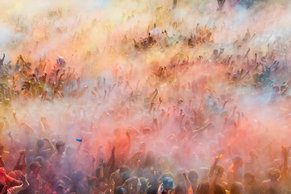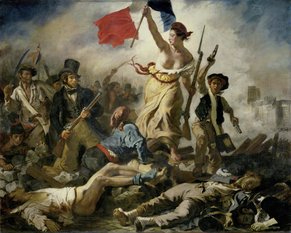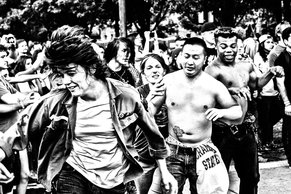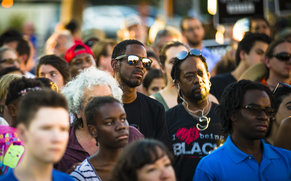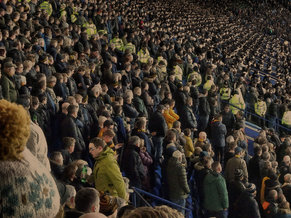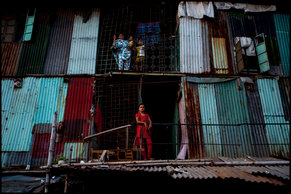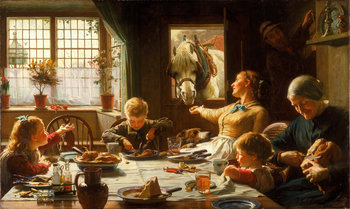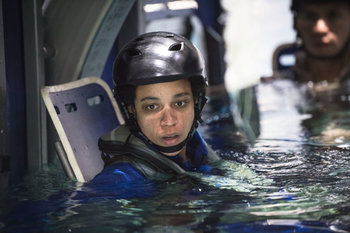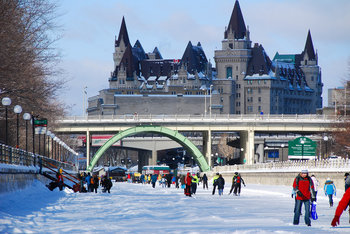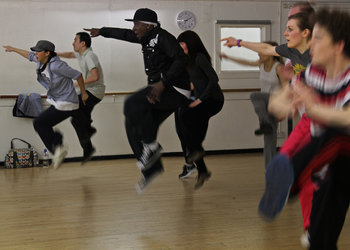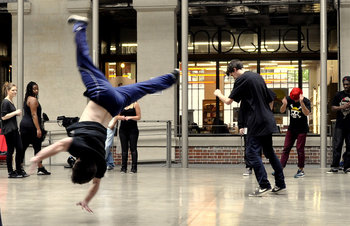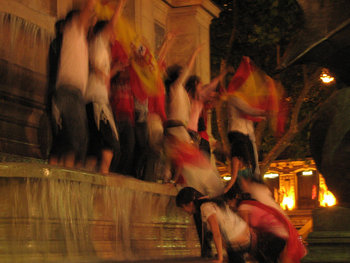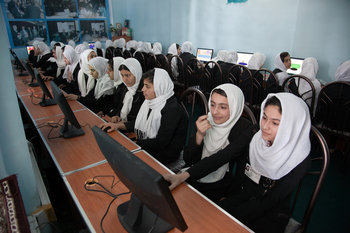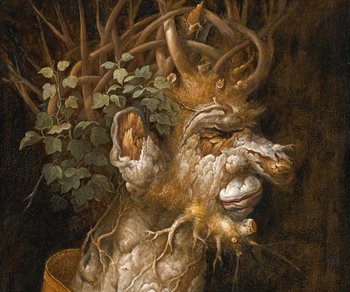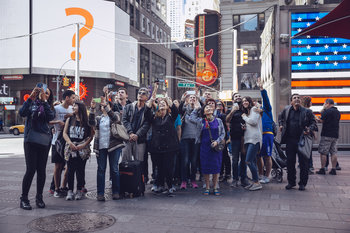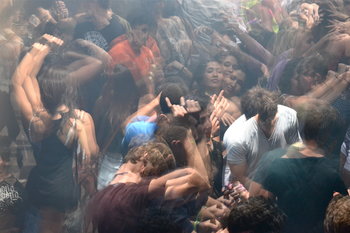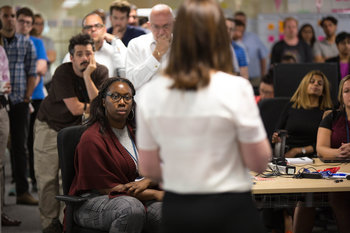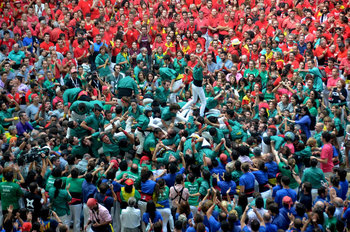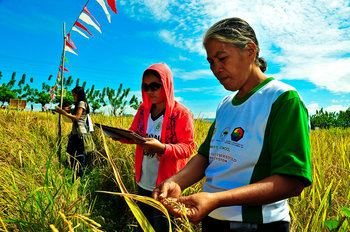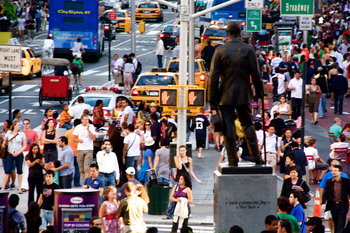
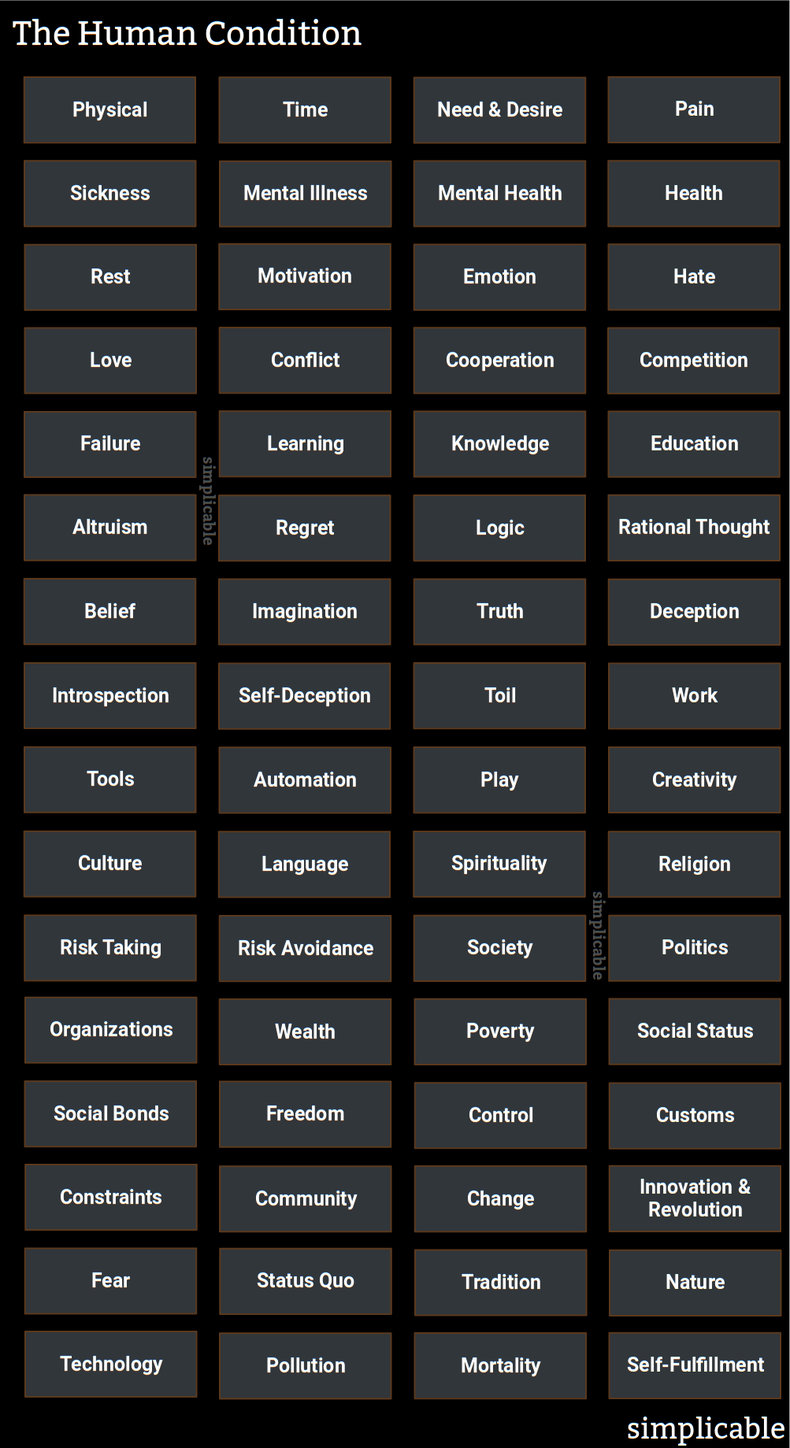
Physical
The experience of the body and ability to move through 3-dimensional space.Time
Movement through time from past to present with no ability to jump forwards or go backwards in time.Need & Desire
Human needs and desires such as air, water, food, shelter, clothing, sleep, reproduction, love, belonging, respect, self-esteem, freedom, recognition and self-actualization.Pain
Pain due to factors such as injury, sickness and hunger.Sickness
Disease and illness.Mental Illness
Dysfunctions of thinking, emotion and behavior.Mental Health
Experiencing thought and emotions that are rational and conductive to quality of life.Health
Physical, mental and social well-being and the absence of disease or infirmity.Rest
The human need to rest and sleep to remain physically and mentally functional.Motivation
The desire to do things.Emotion
States of mind that color all thoughts such as joy.Hate
Feeling an intense dislike of people, situations, systems or other things.Love
The ability to feel affection for people, animals, nature, things and abstract concepts.Conflict
Malicious and destructive interactions between people or groups.Cooperation
The ability to work together towards common goals.Competition
Competition for resources and position between people and groups. Competition is also a common element of play.Failure
A plan that doesn't achieve its aims.Learning
The ability to learn from information and your experiences.Knowledge
Information as it exists in the human mind. For example, an engineer who knows how to design a safe aircraft.Education
The process of developing the mind and acquiring knowledge.Altruism
Doing things that you perceive as good for people and planet without any expectation of reward or recognition.Regret
Regret at past failures that can't be undone.Logic
The ability to think in a systematic way working with facts and probabilities.Rational Thought
Developing ideas that other people would view as reasonable.Belief
The ability to believe in things you can't directly confirm.Imagination
Seeing beyond current realities to invent.Truth
Representing fact and opinion truthfully and candidly.Deception
Attempts to deceive others.Introspection
The ability to examine your own character, behavior, thoughts and emotion to understand yourself.Self-Deception
Attempts to deceive yourself.Toil
Labor that is unpleasant but necessary.Work
Labor that is satisfying as an act of productivity and creation.Tools
The use of technology to improve work or make it more productive.Automation
The use of technology to eliminate toil or improve efficiency and quality.Play
Setting and achieving goals that have nothing to do with production in the pursuit of joy. Essential to the full development of the mind.Creativity
Using the imagination to create unique and novel value.Culture
Transcending the stark realities of production and logic to enjoy life through human elements such as art, music, cuisine, literature, performance art, film, festival and celebration.Language
The ability to communicate using language.Spirituality
The ability to contemplate or experience the nature of the universe and the self.Religion
Organized spirituality.Risk Taking
The pursuit of opportunity despite risk.Risk Avoidance
The pursuit of safety despite opportunity.Society
Institutions, systems and customs that govern life in a place.Politics
The means by which groups make decisions.Organizations
The tendency for people to organize into groups with a well defined structure such as a government, institution, company or non-profit organization.Wealth
The stored value accumulated by a society, organization, group or individual.Poverty
The inability of a society, group or individual to secure the basics of life such as clean air, water, food, shelter, clothing, health care and education.Social Status
The tendency for people to rank and compare themselves and others according to a broad range of social signals such as coolness or wealth.Social Bonds
The development of relationships between people such as romantic love, family and friends.Freedom
The ability to do what you want free from constraint. For example, privacy is the freedom to be unobserved.Control
Control of resources and rules of behavior that are imposed on individuals and enforced with systems.Customs
Flexible rules that are followed on a more or less voluntary basis. A pleasing alternative to strict rules and controls.Constraints
Constraints imposed upon an individual by society, their group membership or realities such as a lack of resources.Community
The social interactions that occur in a place such as a neighborhood or town. In many cases, a place develops its own culture that guides local interactions.Change
The fact that all things constantly change such that societies, organizations and individuals must regularly reinvent themselves to survive.Innovation & Revolution
Change that is sudden and disruptive.Fear
A dread emotional state that is a useful reaction to imminent risk. Fears can also be irrational.Status Quo
The tendency of societies, groups and individuals to fight dramatic change in an attempt to preserve stability.Tradition
Things that are done a certain way because they have long been done that way. Often valued by people as an element of culture that provides stability and a sense of connectedness with the past.Nature
The world beyond human things such as air, water, land, animals, plants and ecosystems.Technology
Human manufactured things that have perceived value for systems or people.Pollution
The tendency for technology to be poorly designed such that it destroys nature.Mortality
The knowledge of our inevitable death.Self-Fulfillment
The pursuit of a meaningful life.| Overview: Human Condition | ||
Type | ||
Definition | The characteristics of human existence including thought, emotion and behavior at the system, social and individual level. | |
Related Concepts | ||


